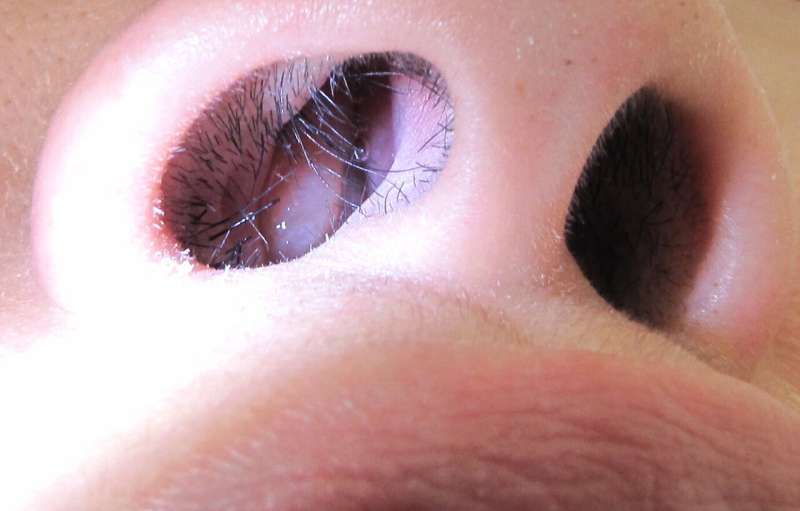What is a nasal polyp and how is it treated? - Medical Xpress

If you feel like spring allergy season never ends or your colds always turn into sinus infections, you may have the potential to develop nasal polyps.
Although you may not know they are there, nasal polyps can block your nasal passages and impact your breathing, among other symptoms. Patients often ask me about what could be causing their chronic congestion or sinus issues, so I wanted to share some information on what nasal polyps are and how they may impact your life.
What are nasal polyps?
Nasal polyps are soft, teardrop-shaped growths of inflamed tissue that can grow in your nasal cavity or sinuses. The sinuses are air-filled spaces connected to your nasal cavity. Nasal polyps may grow large enough to block your nasal cavities and sinuses, which prevents normal function.
What causes nasal polyps?
The causes of nasal polyps are still being researched extensively, but they are frequently associated with chronic inflammation and irritation of the lining of your nasal cavities and sinuses. Nasal polyps are more common in people with chronic sinus infections, asthma, allergies (hay fever) and sensitivity to aspirin. Certain genes and immune disorders may also lead to the development of nasal polyps.
What are the symptoms of nasal polyps?
If the polyps are small, you may have no symptoms at all. As the polyps grow, frequent symptoms include nasal congestion, difficulty breathing through your nose, decreased sense of smell and facial fullness or pressure. Patients often note they feel as though they have a cold all the time. Frequent sinus infections may occur with facial pain and yellow or green nasal drainage.
Similarly, how would someone know if they have a nasal polyp?
It would be difficult for someone to know if they have nasal polyps without being evaluated by a physician who can see the polyps on physical exam or with medical imaging. Typically, patients with the aforementioned symptoms are referred by their primary care doctor for evaluation by an otolaryngologist (ENT), or ear, nose and throat specialist.
What diagnostic tests would you perform if you think someone has nasal polyps?
Nasal polyps can sometimes be seen with a simple lighted instrument on physical exam. Often an in-office test called a nasal endoscopy is performed with a small camera for a more detailed view of your nose and sinus openings. An imaging study such as a CT scan of your sinuses may be performed for a view of the deeper areas of your sinuses. Additionally, allergy testing is sometimes performed to see if allergies are contributing to chronic inflammation.
How are nasal polyps treated?
Treatment is aimed at reducing the inflammation of your nasal passages and sinuses as well as shrinking the nasal polyps. Medical therapy is usually the first approach, and surgical therapy is used for persistent symptoms after attempting medications. It is always important to develop a long-term treatment plan with your doctors to manage your symptoms and address underlying causes.
What medications are used to treat nasal polyps?
Patients are usually first started on daily rinses of the sinuses with a saltwater solution and a corticosteroid nasal spray. Other medications may include antihistamines to help treat allergies and oral antibiotics to treat chronic or recurring infections. Some patients benefit from allergy shots or aspirin desensitization if that's a contributing factor. There are also prescription medications, including a relatively new injectable biologic, that can reduce polyps.
What kind of surgery is used to treat nasal polyps?
Surgery to remove nasal polyps is called endoscopic sinus surgery. The ENT physician inserts a small camera into your nasal passages to visualize the polyps in the sinuses and nasal passages. Using tiny instruments, the polyps are removed, allowing the sinuses and nasal passages to function better. The surgery is usually an outpatient, minimally invasive procedure and patients can go home the same day.
How do you prevent nasal polyps from recurring?
It is important to recognize that nasal polyps are a chronic condition. Routine follow up with your healthcare team is essential, as nasal polyps can quickly recur or worsen without continued therapy addressing the underlying cause of the polyps. Taking the recommended medications and scheduling routine follow up appointments is the best way to control your nasal polyps.
Overall, nasal polyps can be very debilitating to patients. The right treatments can lead to a significant improvement in their symptoms and a much better quality of life. More than anything I enjoy seeing this improvement and helping them reach their healthcare goals.
Explore further
Citation: What is a nasal polyp and how is it treated? (2021, August 12) retrieved 31 August 2021 from https://medicalxpress.com/news/2021-08-nasal-polyp.html
This document is subject to copyright. Apart from any fair dealing for the purpose of private study or research, no part may be reproduced without the written permission. The content is provided for information purposes only.


Comments
Post a Comment